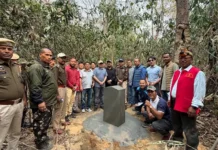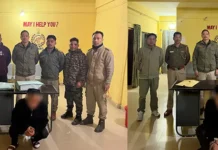NIRJULI, 7 Nov: The two-day international conference, titled ‘Invisible struggles: Mental health and the lived realities of the peripheralized’, concluded at the North Eastern Regional Institute of Science and Technology (NERIST) here on Friday.
The seminar brought together leading experts from prominent institutions and organisations across the country and abroad to discuss, among other things, mental health issues and rights of LGBTQ+ individuals, according to a NERIST release.
The event featured panel discussions, key addresses by experts and academicians, and competitions commemorating the Suicide Prevention Month.
The panellists explored mental health through the lens of indigenous knowledge, justice and cultural identity, emphasising the importance of contextual and community-based approaches to suicide prevention. They called for recognising indigenous worldwide views and collective practices as centre to building inclusive, and grounded mental health frameworks.
A panel discussion, titled ‘Cultural and tribal perspectives on mental health and suicide prevention’, was curated by Mariwala Health Initiative, Mumbai.
Another panel discussion, titled ‘Mental health ecosystem – Reflections and lived experiences of LGBTQ+ individuals’, curated by BRIDGE, Kolkata, highlighted that mental health is profoundly shaped by social acceptance, home, and community support, extending far beyond clinical settings.
The panellists explored the complex intersections of identity, stigma, and wellbeing, pointing to persistent challenges like transphobia, unemployment, and institutional neglect.
The participants underscored the need for sustained funding, gender sensitisation, and the inclusion of gender studies in education. Additionally, the participants stressed on integrating indigenous and community-based approaches into mental health frameworks, noting the significant gap between policy and the real-world implementation of queer rights.
A critical point raised by the AP QueerStation was that, given the limited resources in Arunachal Pradesh, the community’s immediate need is not just for formal therapy but for genuine allies who will listen and understand.
Addressing the common narrative, the panel asserted that while the community uses the language of human rights, their identities and struggles are indigenous to the region, urging society to validate and see their realities. The panellists called for creating an inclusive and empathetic ecosystem to support the mental wellbeing of all LGBTQ+ individuals.
Assam University Vice-Chancellor Dr Rajive Mohan Pant underscored that in this fast-changing world, stress is inevitable, and urged the educational system to discuss these pressures and “see the invisible distress among students.”
Dean (Academic) Prof Sarsing Gao confirmed the conference’s impact, noting the significance of viewing mental health from a systemic perspective, rather than a purely individual one, and praised the inclusion of gender issues
NERIST Director Prof Narendranath S issued a compelling call to action, urging translation of learned experiences into concrete actions, and upholding integrity to build community momentum. He also emphasised the importance of “openly discussing the limitations of the institute and education to overcome them.”
The seminar was organised by the humanities and social sciences department of the NERIST, in collaboration with the union Tribal Affairs Ministry and the state Social Justice and Empowerment and Tribal Affairs Department.
Kolkata-based BRIDGE and Mumbai-based Mariwala Health Initiative were the knowledge partners.


